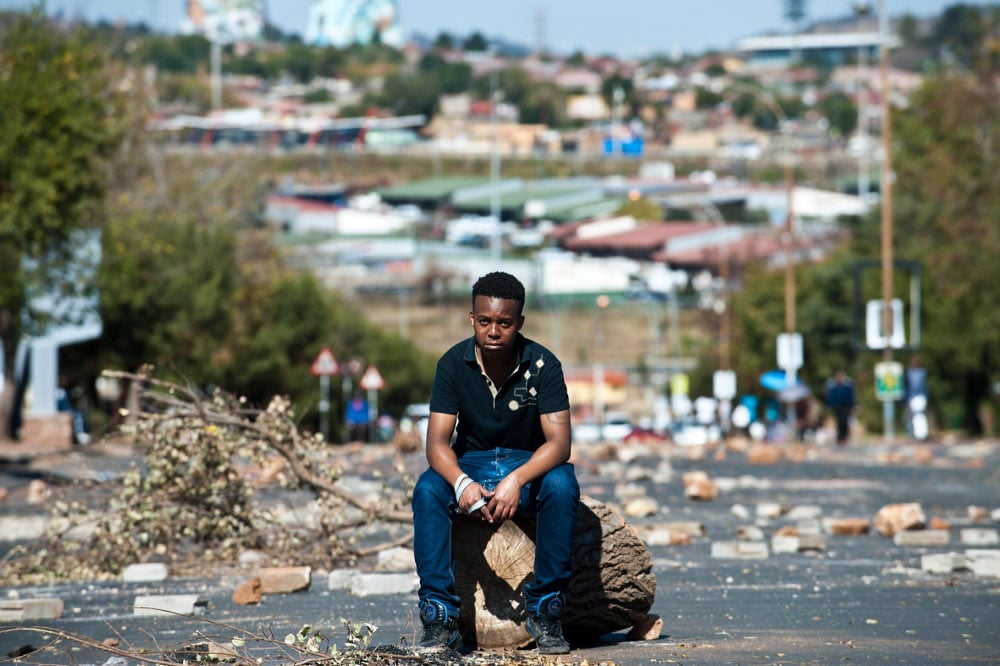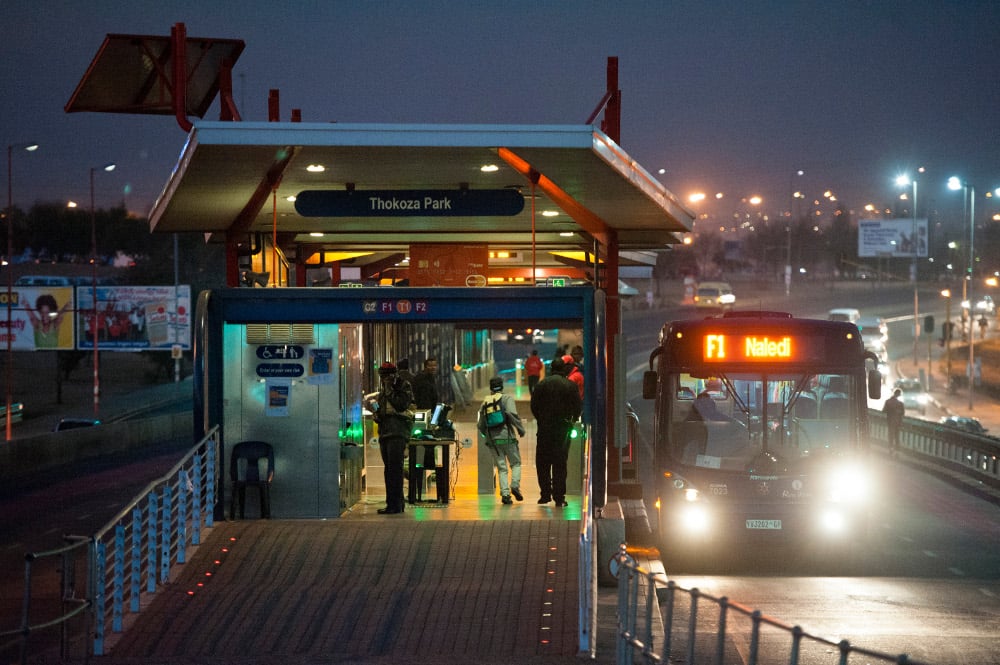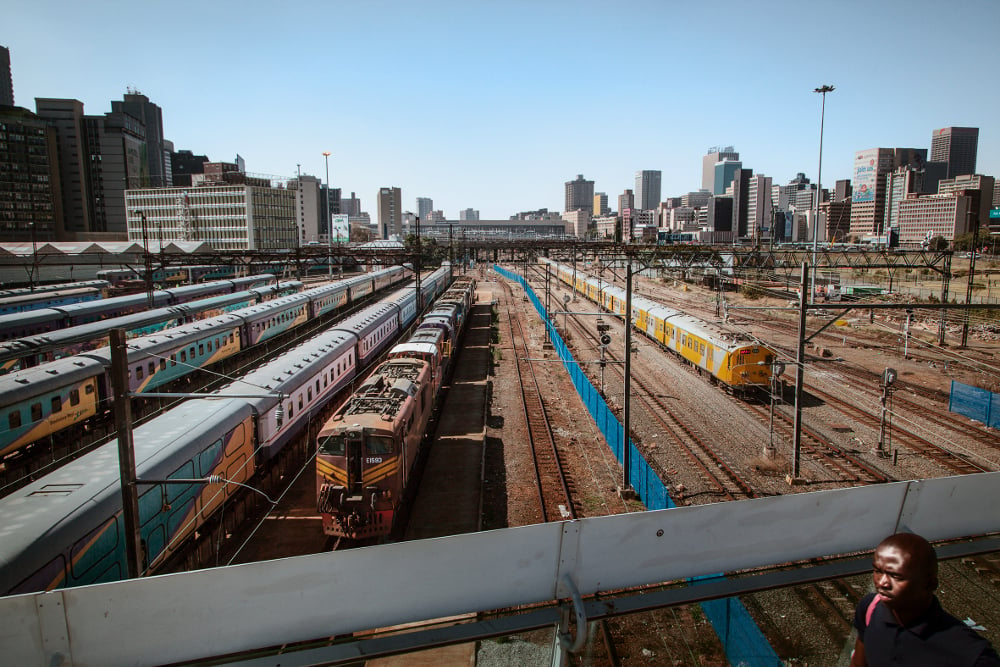Ntando Magubane listens to mayor Parks Tau's address alone at Thokoza Park.
In Braamfontein, right in the administrative heart of Johannesburg, mayor Parks Tau took the podium before a packed marquee to deliver his state of the city address on Wednesday.
But on the far side of the metropolitan area, both geographically and economically, his audience numbered exactly one.
At the Thokoza Park viewing site in Soweto, where the city had set up an outdoor screen linked to Braamfontein by satellite, 31-year-old entrepreneur Ntando Magubane sat alone, scribbling in his notebook and unhindered by the large crowd for which provision had been made.
To be sure, some of the residents of Soweto had other things on their minds on Wednesday morning. Ten minutes away in Orlando West, those living immediately adjacent to the famous Vilakazi Street and its Mandela House had, that same morning, blockaded the streets with rocks, burning tyres and, in one instance, a large mound of soil in protest at electricity prices and disconnections.
The numerical difference told a story all by itself. While Magubane was settling on to the grass in splendid isolation to hear how his city plans to make his tomorrow better than his today, not far away 250 people crammed into a small community hall to hear whether their demand for flat-rate monthly electricity payments would be met.
The protesters were unsatisfied and quickly spilled back on to the streets, where rubber bullets sang just as Tau started speaking.
Prepaid power
The protesters of Orlando West were not angry at the City of Johannesburg, as such. They buy electricity directly from Eskom, which, they say, has recently started forcibly installing prepaid electricity meters that only dole out power for payment and at rates they simply cannot afford. In the process many households had been cut off from the grid.
But after they had vented their frustration at the national electricity parastatal, the protesters started to enumerate their subsidiary grievances. All of which fall in part, or entirely, into the city’s sphere or responsibility: transport, infrastructure such as pavements and street lights, the fear that prepaid water meters would be next. The state of city services did not impress them – nor did the administration responsible for those services.
“Vote for the ANC?” exclaimed protester Katlego Mohlabane when asked about his choice come the 2016 local government elections. “No my friend. I have seen what the ANC is capable of.”
That is, perhaps, not what a mayor in his last year in office would like to hear on the day of his most important annual showcase event.

Protester Katlego Mohlabane amid the debris in a street in Orlando West, where angry residents vented their frustration at Eskom over the installation of prepaid electricity meters. (Delwyn Verasamy, M&G)
Down Thokoza way, Tau had a better morning with Magubane, the lone listener, expressing guarded approval.
“I’m a little happy about what he said,” Magubane summarised his reaction later in the day, after perusing his own notes and giving Tau’s speech some thought. “It’s not new things, but there are opportunities there that I like.”
Battle for control
Less than five years and 10km separate Mohlabane and Magubane. They are of similar build and background, and even their politics have much in common. But in a difference that will in all likelihood define the battle for control of Johannesburg in 2016, the one sees his city as providing opportunity, whereas the other sees a city that either fails to address obstacles or actively makes daily life harder. Even when the city’s intentions are good.
“This Rea Vaya, ever since its establishment traffic has probably been 20 times slower,” says Mohlabane of the city’s bus rapid transit system that had dedicated lanes carved out of existing streets. “Every so often the Rea Vaya drivers go on strike, but even then the [venerable public transit buses of] Putco can’t use those lanes.”
Rea Vaya is the linchpin for the plans Tau laid out on Wednesday, and the most widely visible change his administration has wrought on the city with its many gleaming bus stations.

The Rea Vaya bus service is intended to ease the city’s transport woes but has run into problems. (Delwyn Verasamy, M&G)
On that network depends the reversal of apartheid town planning that makes for Mohlabane’s four hours of daily commuting time. It is to be the main artery that makes accessible opportunities for work, education and play. But for a man who works in Randburg, where the buses do not yet run, it is just another impediment.
For a time Rea Vaya served Magubane just as intended, making his trips to and from work if not effortless, then at least somewhat more reliable. But then it moved out of its pilot phase. “When it started it used to be much cheaper than the taxi,” he says. “Now it is very much the same cost. I don’t use it anymore.”
The Rea Vaya concept – buses unencumbered by normal traffic running at short intervals – appeals to both men. Yet it falls short in implementation for them both, one owing to routes, the other because of cost. Such problems of implementation on big and bold ideas seem common to almost every project Johannesburg has tackled in recent years.
Internet access
Free and fast access to the internet would have a radical impact on his life, Mohlabane says, freeing up time he spends in queues transacting the business of everyday life and giving him access to online education resources he could use to better himself. In his 2014 state of the city address, symbolically held in Soweto, Tau announced that every library in the city would have internet access by the end of the year.
“My local library has six computers for all of us,” Mohlabane says. “There are so many people that they run it on a schedule like they do at an internet café. You can’t use it for long enough.”
The free wi-fi hotspots at Rea Vaya bus stations also announced by Tau in 2014? On Wednesday those around Orlando West were broadcasting their availability to the world, but were not actually connected to the internet. The free neighbourhood wi-fi Tau announced this Wednesday? Only for the urban centre of Braamfontein, a long way from where Mohlabane lives and works.
The Jozi@Work initiative, a centrepiece of Tau’s last two speeches? Magubane is thrilled at the opportunity to tender for small pieces of municipal work such as gardening in local parks and has in fact tendered for several such jobs. He has won none of the tenders, but remains optimistic – because the process is sufficiently complicated that he believes there is money to be made in teaching others how to do it, or in directly helping them with their bids.
Transport
Another major city transport initiative has relevance for neither Magubane nor Mohlabane; the distances they travel every day make cycling wholly impractical. But the same problems of implementation are to be found in the city’s cycle lanes and routes currently being rolled out.
“There are a couple of issues,” says David du Preez, chairperson of the Johannesburg Urban Cyclist Association. “There are some issues around design … then obviously there is policing of the cycle lanes. A lot of people park in cycle lanes during the day.”

A pedestrian crosses the Mandela bridge that links Braamfontein and the city. (Gustav Butlex)
Yet, in another feature seemingly common to all major Johannesburg city initiatives, Du Preez sees success just around the corner. A few minor design changes, policing of cycle lanes with the help of a CCTV system and time for the city to come to grips culturally with the right to life of cyclists, and that system of cycle lanes could change things for the better.
After all, even though the sprawl of Johannesburg is not friendly to cyclists, the elements are in the city’s favour.
“Jo’burg weather is great for bicycles,” he says. “There are the summer thunderstorms, yes, but you can see those coming and they are not for protracted periods of time.”
Small tenders
Likewise, Magubane expects Jozi@Work to eventually come through for him and deliver the kind of small tenders he can scale up into bigger tenders and eventually into riches that can help him fly the coop. He is already considering the kind of qualifications that would travel well if he were to relocate to Europe one day.
For Mohlabane, the free internet access that can be provided in Braamfontein can just as well be provided in Orlando West, eventually, and the Rea Vaya network could be extended far enough to solve his transport woes.
Perhaps things will indeed be better down the line, he allows, at least in small respects. And, just maybe, down the line will not be that great a distance.
“There is this trend we’ve noticed of stuff always getting done prior to elections,” Mohlabane says. “There is a correlation there. Maybe we’ll have internet access up and running next year. Just don’t expect me to hold my breath.”